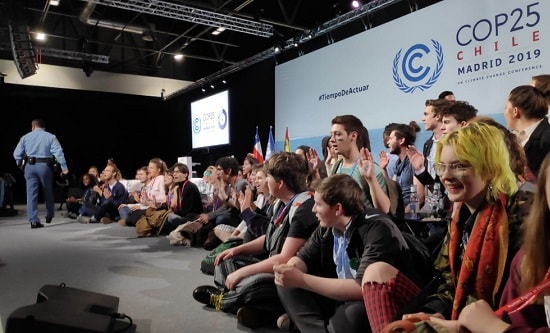
‘From Santiago to Madrid, the world is waking up to the climate crisis! We say enough. We no longer support the systems that drive the climate crisis. We will continue to rise against governments that don’t represent us, and that prioritise profit over the wellbeing of its people and climate’
– Angela Valenzuela, student climate striker from Chile
On 11 December 2019 environmental activists took over and occupied the main stage at the 25th UN Climate Change Conference in Madrid, Spain (COP25). The protesters denounced the rich countries looking for loopholes to increase their profits instead of solutions to the climate crisis and demanded they ‘step up and pay up’ for the climate devastation already wreaked against poorer nations. REBECCA DELACROIX reports.
The same afternoon over 300 activists organised a ‘cacerolazo’, banging metal pots and pans in protest, before UN Secretary General Antonio Guterres gave his speech at the plenary session. Security quickly cracked down on the dissent, kicking out the activists, stripping them of their passes, and temporarily banning them from the conference. Outside, the protesters continued their speeches and chanted for the COP25 to ‘kick polluters out, let the people in’. All the while, climate criminals like Shell and British Petroleum and fossil fuel lobbyists remained inside. A statement from the protesters said there ‘could be no better symbol of this crisis we face. People around the world are crying out for justice, and fighting oppression, while those in power attempt to shut us out.’
False solutions and CO2 colonialism
Throughout the COP, the rich imperialist nations including the US, Britain and the European Union consistently blocked negotiations on compensation for underdeveloped countries. Activists criticised the false solutions such as ‘carbon market mechanisms’ which dominated the discussion at COP25. Originally established under Article 6 of the Paris Agreement in 2015, the rules for ‘carbon market mechanisms’ are still in dispute, deferred until COP26 Glasgow in November. They are designed to make carbon reduction cheaper for rich countries, with the least possible disruption to their profit-making, at the expense of poorer nations. When a rich country exceeds its carbon emissions quota it can simply buy up carbon ‘permits’ from an underdeveloped country that has not exceeded its limits. Underdeveloped countries can turn ‘carbon offsetting’ activities like planting trees into tradable credits to be sold off to the highest bidder. Shell, BP and ExxonMobil have enthusiastically supported these initiatives; just last year each of these fossil fuel giants donated $1m to support the US’s inadequate proposal of a carbon tax.
Carbon markets do not work to reduce emissions – in fact under these schemes global emissions have continued to rise. Executive Director of the Indigenous Environmental Network, Tom Goldtooth explained: ‘this is nothing to do with addressing global warming and climate change. It has everything to do with trading mechanisms… the issues we as indigenous people [are concerned about] is that this is nothing but a grab for CO2 colonialism’. Carbon offsetting has been a disaster for indigenous peoples and local communities in poorer nations who have experienced large scale and violent evictions in the name of ‘conservation’ as well as corporate land grabs. Some families have been contractually bound to manage forests without compensation in a form of carbon slavery.
Climate criminals welcome
While those on the frontlines of the climate crisis were excluded, representatives of fossil fuel companies were more than welcome in the halls of COP25, with the list of registered participants in the conference including executives from Shell, British Petroleum, Total, Eni, Enel, BHP Billiton, Engie, Rio Tinto and Equinor. The presence of these corporations, with their logos plastered onto walls alongside greenwashed advertising, belied any legitimacy of the conference. Protesters covered their ears and walked out of a talk by Shell Vice President Duncan Van Bergen as he praised a new initiative to monetise ‘natural climate solutions’. Van Bergen later fled the conference after being confronted by a group of youth strikers.

COP25 Madrid itself was an event bankrolled by big polluters; with sponsorships from Santander, a bank which has provided more than $44 billion to companies involved in rainforest deforestation; Suez, one of the largest water privatising companies operating in Chile and around the world, and Endesa, a multinational electrical company and Spain’s biggest polluter.
Real change will come from the people
COP25 was originally going to be held in Brazil, before right-wing climate change denier President Jair Bolsonaro cancelled the conference, so it was moved to Santiago, Chile, where it was again cancelled, just a month before it was scheduled to start. On 30 October 2019 President Sebastián Piñera announced that Chile would no longer host COP25, stating that his government’s primary concern was ‘restoring public order’ after a tide of anti-government protests swept the nation demanding an end to years of austerity and crippling economic inequality. Mapuche and Quechua indigenous peoples leading the resistance in Chile ensured the demands for indigenous rights and environmental protections were at the forefront of the movement.
The decision to move COP25 6,000 miles from Santiago to Madrid was an attempt to disempower Chilean and other Latin American activists and organisations who had been preparing for the summit for months. The UN Climate Change Conference has now taken place in Europe for the fourth time in the last five years.
COP25 was a corporate cop-out from the outset, more a corporate trade show than a summit to tackle the environmental crisis. When Fridays for Future founder Greta Thunberg addressed COP25, she condemned companies and politicians for ‘making it look like real action is happening when in fact, almost nothing is being done’ through the techniques of ‘clever accounting’ and ‘creative PR’. The only positive outcome of COP25 was the unprecedented number of activists who mobilised to hold the sham of a conference accountable, staging actions throughout the event. As Thunberg said: change will ‘not come from the governments or the corporations, it comes from the people.’
Fight Racism! Fight Imperialism! No 274, February/March 2020




